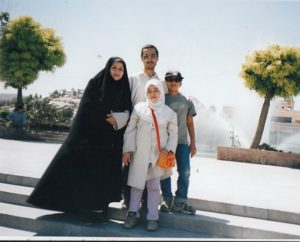Shahīd Shahriyārī’s Wife
November 10th, 2016
My whole being and love [for life] was Majīd. Perhaps only an hour had passed from the death of my beloved that I called home. I was extremely concerned for my daughter. I asked one of our family friends to go to our home. My son Mohsen had heard the news before he left the university campus. They had told the children that a bomb had exploded in Dr. Abbāsī’s car and that they should therefore not leave the house. I called Mohsen and asked him how Matīn was. He told me that she had just woken up. When she got on the phone I said, “Hello sweetie, what are you up to?” She said she was preparing breakfast. I asked if Mohsen had told her what had happened. She said, “Yes. Dr. Abbāsī has been assassinated and there is a high security alert on.” I said, “Daddy and I were next to him and got a little injured.” She got very concerned and asked what had happened. I told her that we were slightly injured and that we were in the hospital now. She said, “Has anything happened, Mom?” I said, “Why, is my voice not normal?” She said, “No.”
I thanked God on numerous occasions that I was spared so that I could break the news to the children myself. Even in that condition my voice was not one where anxiety would overcome them. The children eventually arrived [at the hospital]. Mohsen already knew, but Matīn didn’t. When she saw me in the state that I was she asked where her father was. I told her that he was not well and that she should pray for him. She asked, “Mom, what’s happened?!!” I said, “He is not well.” She started to cry. I told her, “Cry aloud, my daughter, and tell everyone that our Dad was the best Dad in the whole world. I used the past tense on purpose so that she would realize her father had been martyred.
After the explosion, when I saw that I was alive, I felt that I could see God’s mercy with my two eyes. This gave me an inner peace that allowed me to speak to my children without a quiver in my voice and to tell them what happened calmly.
